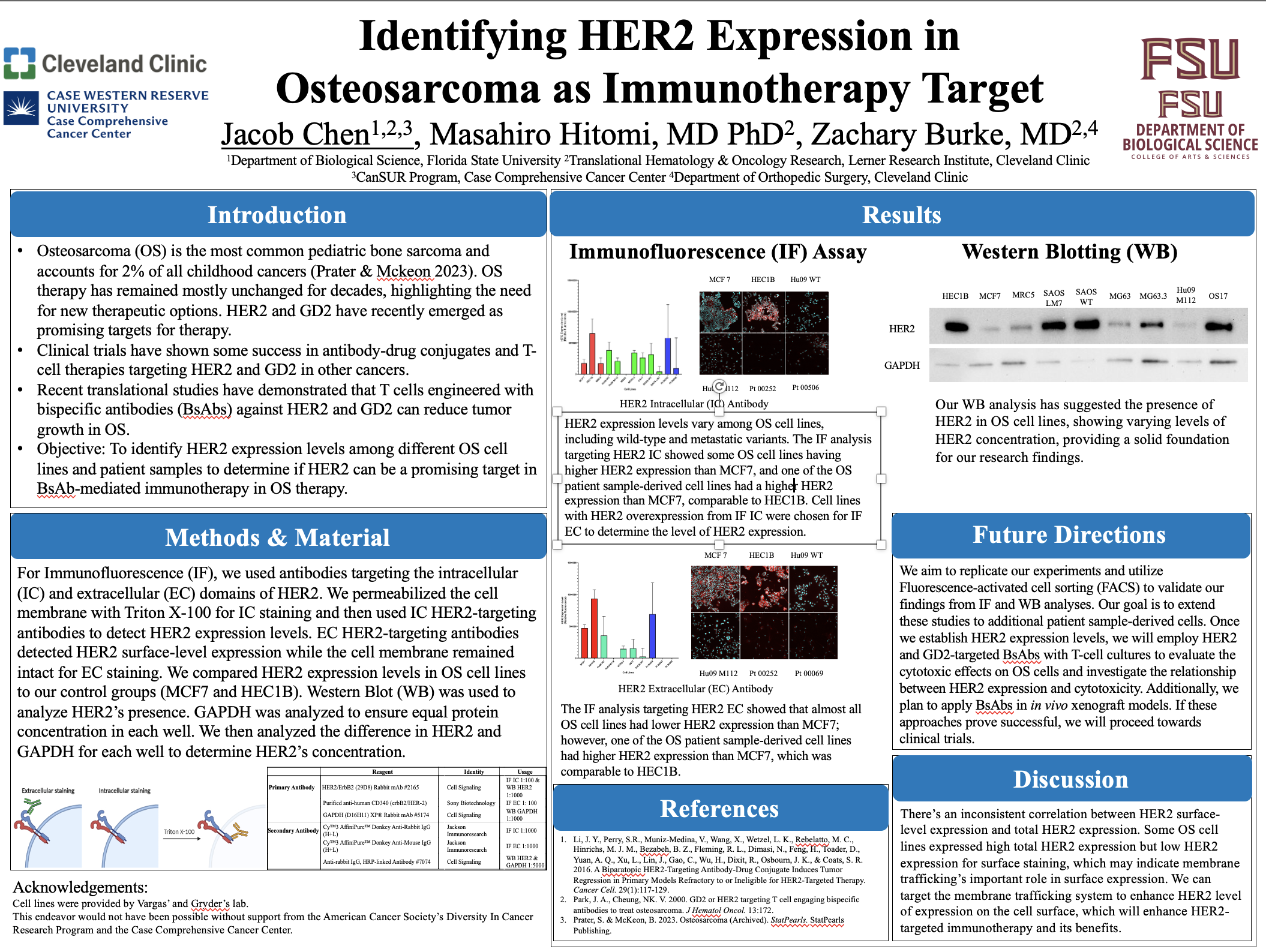Research Symposium
25th annual Undergraduate Research Symposium, April 1, 2025
Jacob Chen Poster Session 1: 9:30 am - 10:30 am/ Poster #60
BIO
I'm a fourth-year biology major at Florida State University, graduating in Spring 2025. This summer, I will return to Cleveland Clinic’s Department of Thoracic and Cardiovascular Surgery for a cancer research project through the American Cancer Society (ACS) and CanSUR Program at Case Comprehensive Cancer Center before starting medical school as an MD candidate, Class of 2029, in the fall.
Growing up in a rural agricultural community, I saw firsthand how physician shortages, limited mental health resources, and socioeconomic barriers impact health outcomes. Caring for my grandfather deepened my commitment to addressing these issues through medicine. I aspire to a career that integrates patient care, research, and advocacy to bridge gaps in healthcare access.
As a first-generation college student and immigrant, I'm passionate about improving healthcare accessibility and affordability. As president of Who We Play For at FSU, I lead efforts to provide free ECG screenings to detect abnormal heart conditions in young people. Through my ACS project, I have also worked to dispel myths about cancer clinical trials and promote diversity in trial participation.
My research interests include immunotherapy, aortic valve surgery, heart transplantation, and cardiothoracic surgical outcomes.
Identifying HER2 Expression in Osteosarcoma as Immunotherapy Target
Authors: Jacob Chen, Zachary Burke, MDStudent Major: Biological Science
Mentor: Zachary Burke, MD
Mentor's Department: Department of Orthopedic Surgery Mentor's College: Cleveland Clinic Co-Presenters:
Abstract
Background. Osteosarcoma (OS) is the most prevalent pediatric primary malignant bone tumor and ranks as the third most common cancer in adolescents, impacting hundreds of individuals under the age of 20 annually. Current standard osteosarcoma treatment involves neoadjuvant chemotherapy, surgical resection, and radiation therapy. Despite these interventions, osteosarcoma has a poor prognosis, prompting the exploration of immunotherapy as a potential treatment option. One promising candidate for osteosarcoma immunotherapy is HER2, although findings from multiple studies have been inconclusive. In a recent translational study, HER2/CD3 bispecific antibody (HER2-BsAb) was used to target the human breast carcinoma cell line MCF-7, which exhibited low-level HER2 expression. The study demonstrated a notable reduction in tumor growth, suggesting HER2-BsAb as a promising effective therapeutic approach in osteosarcoma. Purpose. To identify and characterize HER2 expression level in osteosarcoma cell lines and patient-derived cells from Dr. Burke’s clinic. Methods. We conducted immunofluorescence (IF) assays to assess HER2 expression in OS cells, employing specific HER2 antibodies. MCF-7 and the HER2-overexpressing human endometrial carcinoma cell line HEC-1-B were utilized as positive controls. Additionally, Western blot analysis using anti-HER2 antibodies was employed to validate our IF results and confirm the presence of HER2. Results. HER2 expression levels vary among OS cell lines, including wild-type and metastatic variants. Notably, one patient-derived cell line exhibited significantly elevated HER2 expression, surpassing levels observed in MCF-7 and comparable to HEC-1-B. Our Western blot analysis confirmed HER2 presence, while IF revealed varying HER2 expression levels depending on the antibody targeting intracellular versus extracellular domains.
Keywords: HER2, immunotherapy, cancer

